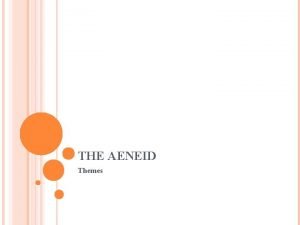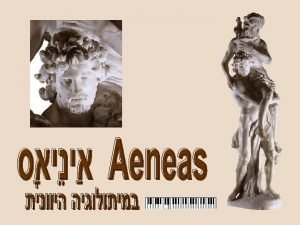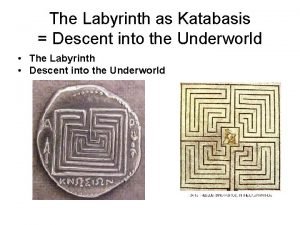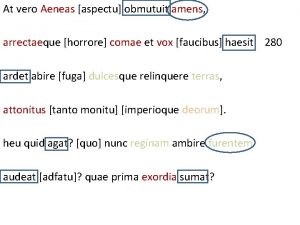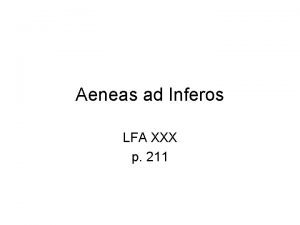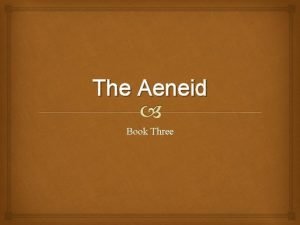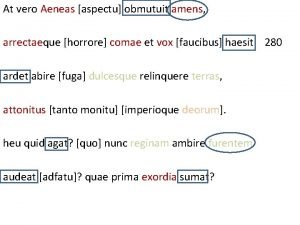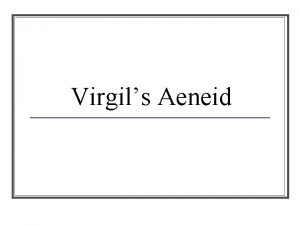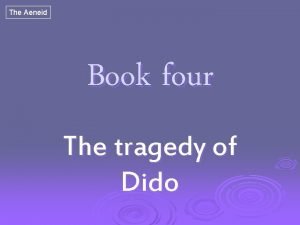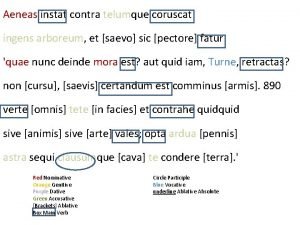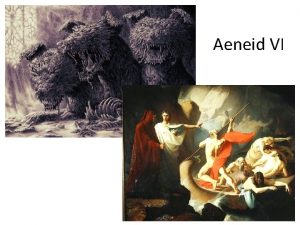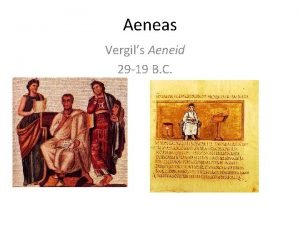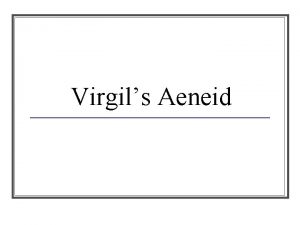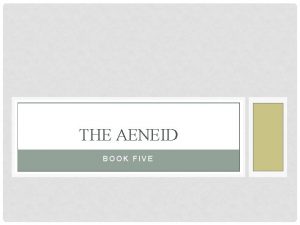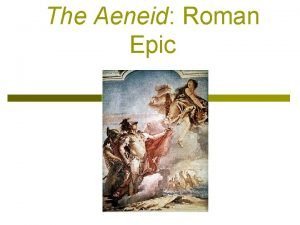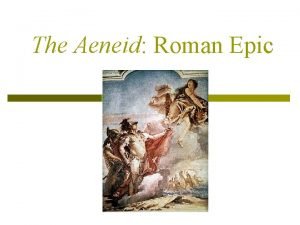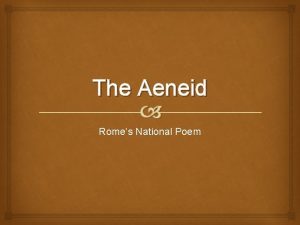THE AENEID Themes THE IMPORTANCE OF FATE Aeneas















- Slides: 15

THE AENEID Themes

THE IMPORTANCE OF FATE Aeneas and his men are left as suffering wanderers after the fall of Troy. However, the direction of Aeneas’ journey is preordained (already decided) according to fate and throughout the text we see both the importance of fate, and it’s inescapable nature. Aeneas’ many sufferings and his glories in battle over the course of The Aeneid merely postpone what is inevitable – his unchangeable destiny to found Rome.

THE IMPORTANCE OF FATE Though the gods have the power to intervene in the lives of the mortals, often disrupting and destroying people’s lives, the power of fate stands above them. As Jupiter explains again and again, there is no changing fate. Though lesser gods than Jupiter repeatedly interfere in Aeneas’ life, trying to advance their own personal interests, they cannot change his larger destiny.

THE IMPORTANCE OF FATE Throughout the epic, individual characters are shaped and developed in terms of their willingness to go along with the directives of fate, or in their resistance to fate. Juno and Turnus are similar, in that they both fight destiny every step of the way. Juno is told repeatedly by Jupiter that there is no way to alter Aeneas’ fate as the founder of Rome but she persists in trying to stop him, destroying many lives in the process.

THE IMPORTANCE OF FATE Likewise, Turnus cannot accept the oracle that means he will not marry Lavinia, in spite of Latinus’ pleas to find a new wife. He misreads or deliberately ignores the signs that tell him Aeneas is fated to succeed and this results in his ultimate downfall. As the strongest opponents to Aeneas’ destiny, Juno and Turnus prolong the action of the epic as they attempt to stop Aeneas.

THE IMPORTANCE OF FATE Due to this, the epic’s final resolution must involve a transformation in both of them, causing Juno and Turnus to finally resign themselves to fate. By the end of The Aeneid, both Juno and Turnus have changed from the strong-willed, arrogant and persistent characters that they were to a weary acceptance that the fates will not allow them to succeed. In strong contrast to this, Aeneas’ character is defined by his complete willingness to follow the dictates of fate.

THE IMPORTANCE OF FATE Throughout his suffering and anguish, Aeneas preserves his sanity, and that of his men, by subordinating (making less important) his own anxieties, worries and feelings to the demands of fate. Aeneas is ruled by the characteristic of piety. When in doubt, he puts his faith in the destiny that has been ordained for him and in the wisdom of the gods. He sacrifices the chance of a happy and peaceful life with Dido to follow Jupiter’s orders because he knows and accepts that his fate must be fulfilled.

THE IMPORTANCE OF FATE Aeneas’ adherence to the dictates of fate would have been admired and respected by Roman audiences. To Virgil’s audience, fate was a divine, religious principle that determined the course of history and culminate in their own Roman Empire.

THE GLORY OF ROME Virgil wrote The Aeneid during the Golden Age of the Roman Empire and it was commissioned by Rome’s first emperor, Augustus. These facts certainly have an influence on the writing in the epic and throughout the text we can see the glory of Rome is alluded to. Virgil’s purpose was to write a myth of Rome’s origins that would emphasise it’s grandness and legitimise the success of the empire.

THE GLORY OF ROME Virgil works backwards, connecting the political and social situation of his own day with the tradition of the Greek gods and heroes, to show Rome has derived from them. Throughout the text Aeneas is portrayed as an exemplary Roman, a man who is well known for his piety and respect for the gods. There is a continual tension in the epic between individual happiness and public mission.

THE GLORY OF ROME Aeneas repeatedly subordinates his own chances at personal happiness for the sake of his destiny and the fulfilment of the ideal Roman. Aeneas acts as a symbol of the difficulties that can beset an essentially decent man and the ways to overcomes these difficulties – with respect, justice and faith in the gods. These characteristics were paramount if Rome was going to be the great civilising force the gods intended it to be.

THE GLORY OF ROME In The Aeneid order and good government triumph over the way of life characterised by the Italians before the Trojan arrival – war, chaos, emotional irrationality. By contrast, the empire under Augustus, who is claiming to be the result of Rome’s epic destiny, was a world of peace, order and emotional stability. The connection between Aeneas and Augustus is hinted at repeatedly but nowhere more so than in the armour Vulcan makes for the hero which illustrates future scenes of Roman glory all the way down to Augustus.

THE ROMAN WAY OF LIFE AND ROMAN DESTINY The moral centre of The Aeneid is the Roman way of life which Augustus was attempting to revitalize in Virgil's own time. This system was ideally based on duty to the gods, to country, and to family and friends. Virgil is aware of the excellent social order which this ideal could produce. Private motivations are often placed in tension against public duty. This tension is at the heart of the parting of Dido and Aeneas.

THE ROMAN WAY OF LIFE AND ROMAN DESTINY Virgil believes that the ideals of Roman life and public service remain worth the often difficult struggle with self. In Book 1 Jupiter summarises what the Roman way of life could, and would give, Rome: a world-rule which brings universal peace and humane civilization. It is available to all who follow the Roman way. Without this knowledge of the greater good, the suffering of Aeneas, Dido, Creusa, Palinurus, Pallas and others are nearly unbearable.

THE ROMAN WAY OF LIFE AND ROMAN DESTINY Aeneas must be brought to understand the promise of this way of life. The pageant of Roman history in Book 6 and the pictures on his shield illustrate the moral qualities of the Roman way of life. Aeneas is the symbol of the difficulties which beset even a decent man in maintaining the humanity which was necessary if Rome was going to be the great civilizing force the gods intended.
 Fate in the aeneid
Fate in the aeneid Aeneas romulus
Aeneas romulus Aeneas fleeing troy
Aeneas fleeing troy Virgil bases his katabasis (descent) of aeneas on
Virgil bases his katabasis (descent) of aeneas on At vero aeneas aspectu obmutuit amens
At vero aeneas aspectu obmutuit amens Why does juno hate aeneas
Why does juno hate aeneas Aeneas hesperiam petens
Aeneas hesperiam petens Aeneas ad inferos translation
Aeneas ad inferos translation At vero aeneas aspectu
At vero aeneas aspectu At vero aeneas aspectu obmutuit amens
At vero aeneas aspectu obmutuit amens Aeneid
Aeneid Aeneas shield
Aeneas shield Aeneid book 4 summary
Aeneid book 4 summary Ille oculis postquam saevi monimenta doloris
Ille oculis postquam saevi monimenta doloris Saevit inops animi totamque
Saevit inops animi totamque Dido laat zich overhalen
Dido laat zich overhalen
